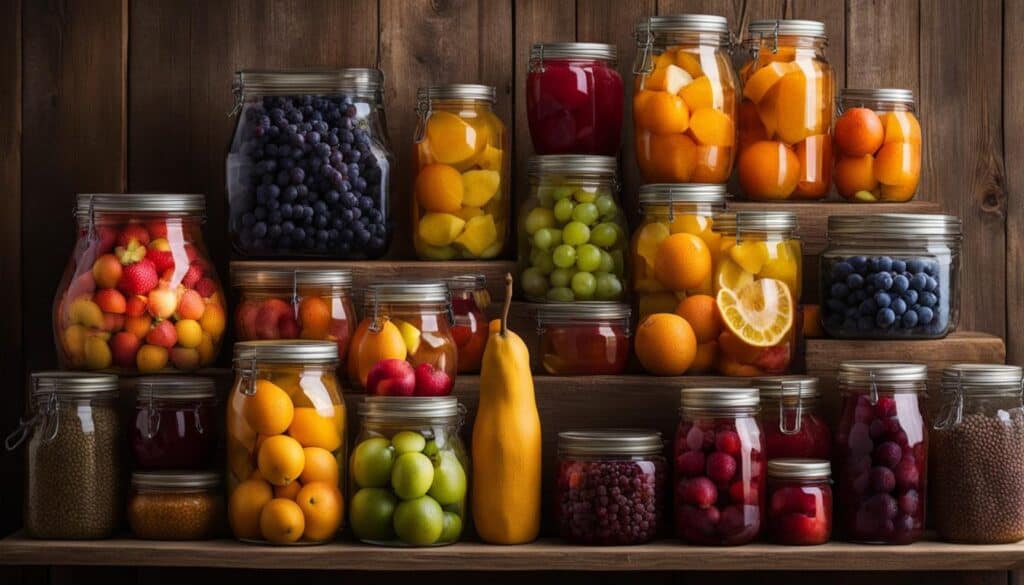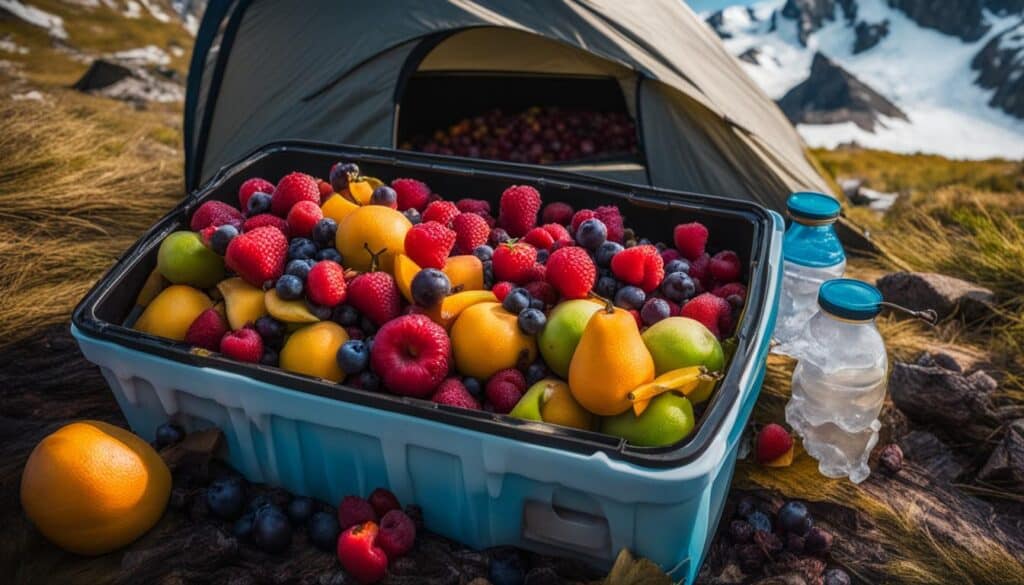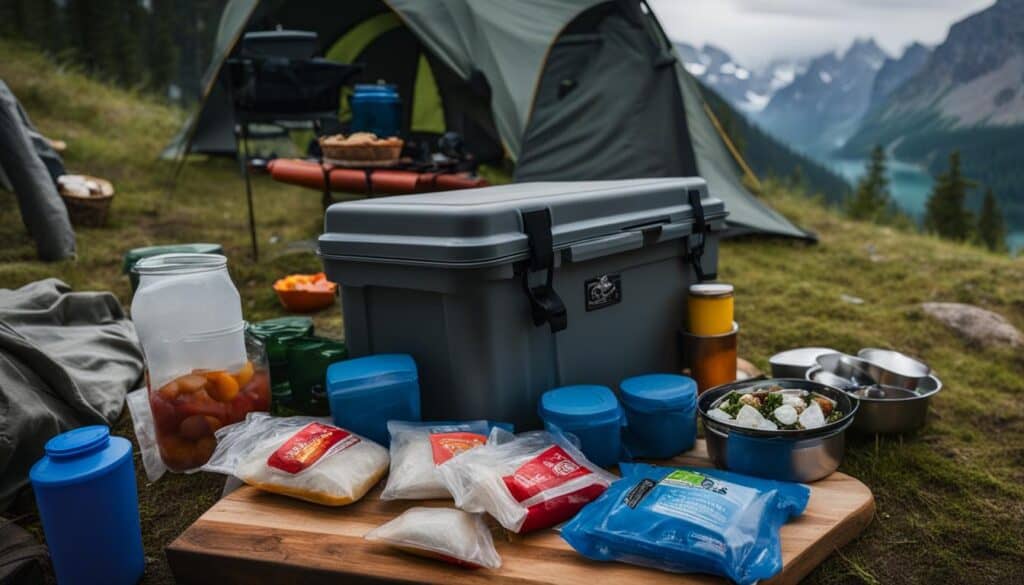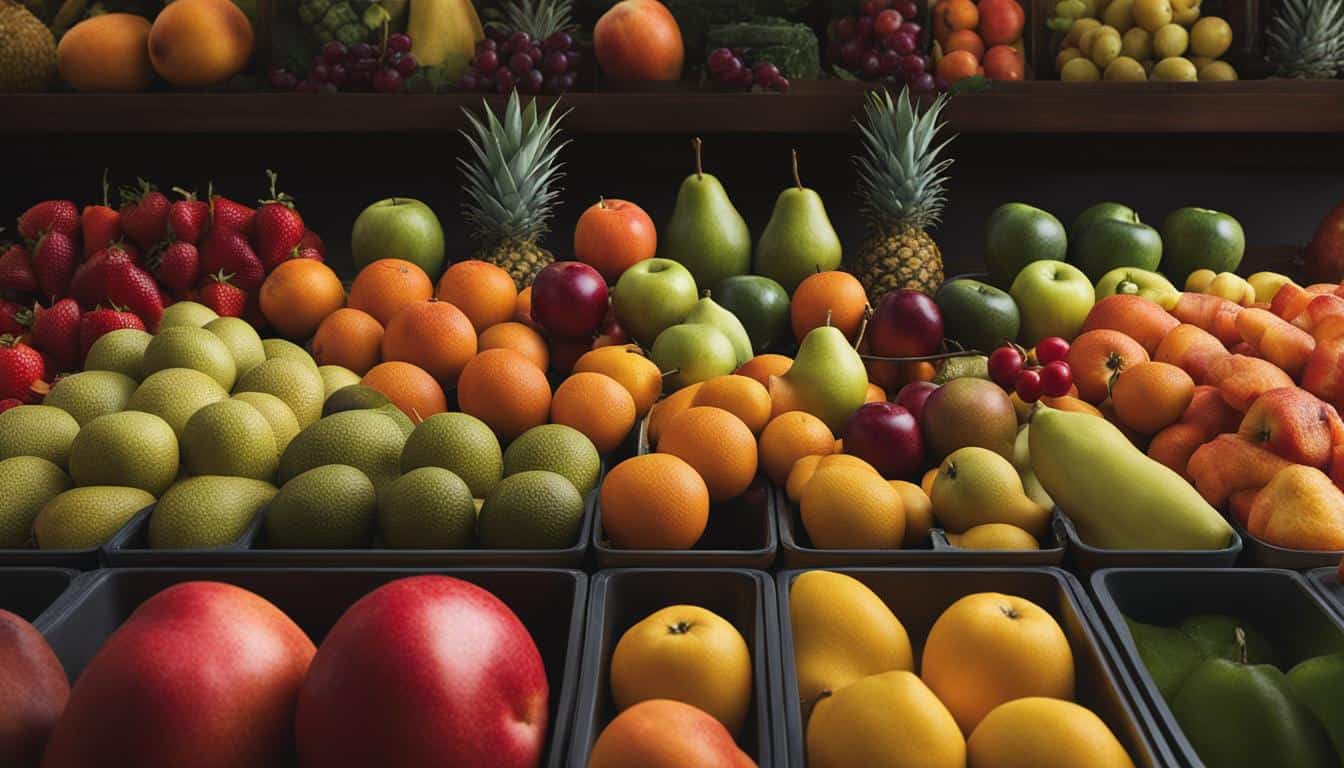Storing fruit properly is essential to keep it fresh for longer. Washing the fruit thoroughly, drying it completely, and storing it in a cool, dry place are key steps to prevent spoilage and extend its shelf life. But what about refrigeration? Do all fruits need to be kept in the fridge? Let’s explore the best ways to store different types of fruits and debunk the myth of whether fruit needs to be refrigerated.
Welcome to Section 1 of our article on fruit storage tips and preservation. Today, I will address the age-old question: does fruit need to be refrigerated? Many of us have been led to believe that refrigerating all fruits is the best way to keep them fresh. However, that’s not necessarily the case.
There are actually different fruits that have specific storage requirements, such as ripening on the counter or being stored in the refrigerator. By understanding these nuances, we can ensure that our fruits stay fresh and delicious for longer periods.
Key Takeaways:
- Fruit storage is crucial for maintaining freshness and preventing spoilage.
- Washing and drying fruits thoroughly before storage helps remove dirt and bacteria.
- Storing fruit in a cool, dry place is generally recommended.
- Some fruits can ripen on the counter and don’t necessarily need refrigeration.
- Understanding the specific storage requirements for different fruits is essential for proper preservation.
Tips for Storing Fruit
Properly storing fruit is essential to maintain its freshness and extend its shelf life. Here are some guidelines to help you store fruit effectively:
- Wash the fruit: Before storing, it’s important to wash the fruit thoroughly to remove any dirt or bacteria. This helps prevent contamination.
- Dry it completely: After washing, make sure to dry the fruit completely. Moisture can lead to rot or mold, so ensuring the fruit is dry before storage is crucial.
- Store in a cool, dry place: Storing fruit in a cool, dry place is ideal. This can be a pantry or a fruit basket away from direct sunlight and heat sources.
- Consider refrigeration: If possible, storing certain fruits in the refrigerator can further extend their freshness. Fruits like berries, grapes, and citrus fruits benefit from refrigeration.
By following these simple tips, you can ensure that your fruit stays fresh and delicious for longer periods.
Remember to check your fruit regularly and remove any spoiled pieces to prevent them from affecting other fruits.
Comparing Different Fruit Storage Methods
| Storage Method | Pros | Cons |
|---|---|---|
| Room temperature | Convenient and allows easy access to the fruit. | Fruits may spoil faster compared to refrigeration. |
| Refrigeration | Extends the freshness of certain fruits. | May affect the texture of some fruits (e.g., bananas). |
| Freezing | Preserves the fruit for long-term storage. | Texture may change after thawing. |
Each storage method has its advantages and disadvantages, so it’s essential to consider the specific fruit type and its storage requirements. By choosing the appropriate method, you can maximize the shelf life of your fruit and enjoy it at its best.
Fruits That Don’t Need Refrigeration
When it comes to storing fruits, the refrigerator may not always be necessary. There are certain fruits that can be stored at room temperature, allowing them to fully ripen and develop their flavors. Some of these fruits include:
- Apricots
- Avocados
- Guava
- Kiwi
- Mangoes
- Melons
- Nectarines
- Papayas
- Peaches
- Bananas
- Plums
These fruits can be stored in a cool, dark place, such as a pantry or a fruit bowl on the kitchen counter. It’s important to check them regularly for ripeness and consume them before they become overripe. For those who prefer their fruits chilled, it’s also possible to store these fruits in the refrigerator for a slightly longer shelf life.
It’s worth noting that while these fruits don’t necessarily need refrigeration, they can still be frozen for long-term storage. Freezing allows you to preserve the fruits’ freshness and enjoy them even when they’re out of season. Simply wash, peel, and cut the fruits into desired portions before placing them in freezer-safe containers or plastic bags.
| Fruit | Storage | Shelf Life |
|---|---|---|
| Apricots | Room temperature or refrigerator | 2-3 days (at room temperature) 5-7 days (in the refrigerator) |
| Avocados | Room temperature or refrigerator | 2-3 days (at room temperature) 4-5 days (in the refrigerator) |
| Guava | Room temperature | 2-3 days |
| Kiwi | Room temperature or refrigerator | 3-5 days (at room temperature) 1-2 weeks (in the refrigerator) |
| Mangoes | Room temperature or refrigerator | 2-3 days (at room temperature) 4-5 days (in the refrigerator) |
| Melons | Room temperature or refrigerator | 5-7 days (at room temperature) 1-2 weeks (in the refrigerator) |
| Nectarines | Room temperature or refrigerator | 2-3 days (at room temperature) 5-7 days (in the refrigerator) |
| Papayas | Room temperature | 2-3 days |
| Peaches | Room temperature or refrigerator | 2-3 days (at room temperature) 5-7 days (in the refrigerator) |
| Bananas | Room temperature | 7-10 days |
| Plums | Room temperature or refrigerator | 2-3 days (at room temperature) 5-7 days (in the refrigerator) |
By knowing which fruits don’t need refrigeration, you can optimize your storage space and ensure that your fruits stay fresh and delicious for longer periods of time.
Freezing Fruit for Long-Term Storage

Freezing is a highly effective method for preserving fruit for an extended period. It helps retain the fruit’s texture, flavor, and nutritional value, allowing you to enjoy it even when it’s out of season. To properly freeze fruit, follow these simple steps:
- Start by selecting ripe, high-quality fruit. Avoid using fruits that are overripe or damaged, as they may not freeze well.
- Wash the fruit thoroughly and remove any stems, pits, or seeds. If necessary, peel the fruit and cut it into desired sizes.
- Blanch the fruit by briefly immersing it in boiling water, then transferring it to ice water to stop the cooking process. This step helps preserve the color, texture, and flavor of the fruit.
- Drain the blanched fruit and pat it dry to remove excess moisture.
- Arrange the fruit in a single layer on a baking sheet lined with parchment paper or a silicone mat.
- Place the baking sheet in the freezer and let the fruit freeze completely. This usually takes a few hours.
- Once the fruit is fully frozen, transfer it to airtight containers or freezer bags. Make sure to label the containers with the fruit type and date of freezing.
- Return the fruit to the freezer and store it at 0°F (-18°C) or below.
When properly stored, frozen fruit can last for up to a year. It’s ideal for using in smoothies, baking, making jams and jellies, or simply enjoying as a refreshing snack. Remember to thaw the frozen fruit in the refrigerator or use it directly in recipes without thawing, depending on your needs. Enjoy the taste of summer all year round with frozen fruit!
| Fruit | Freezing Time |
|---|---|
| Strawberries | 8-12 months |
| Blueberries | 8-12 months |
| Raspberries | 8-12 months |
| Bananas (peeled and sliced) | 2-3 months |
| Peaches (peeled and sliced) | 6-8 months |
| Mangos (peeled and sliced) | 10-12 months |
Tips for Freezing Fruit:
- Use freezer-safe containers or bags to prevent freezer burn and maintain the quality of the fruit.
- Remove as much air as possible from the containers or bags to minimize the risk of oxidation.
- If using bags, squeeze out excess air before sealing them tightly.
- Consider adding a small amount of sugar or lemon juice to the fruit to help retain its color and flavor during freezing.
- Freezing fruit in individual portions makes it easier to thaw and use only what you need.
Does Fruit Last Longer in an Airtight Container?
When it comes to fruit storage, using an airtight container can help extend the shelf life and keep the fruit fresh for longer. Whether you’re keeping your fruit in the refrigerator or in a cool place, an airtight container can prevent moisture loss and preserve the fruit’s quality.
Not all fruits require refrigeration, but for those that do, storing them in an airtight container is highly beneficial. By sealing the container tightly, you create a barrier that prevents air and moisture from reaching the fruit. This helps to slow down the ripening process and maintain the fruit’s freshness. Additionally, an airtight container can also protect the fruit from absorbing any odors present in the refrigerator, ensuring its natural flavors are preserved.
Furthermore, an airtight container can be used to store fruits that don’t necessarily need refrigeration. By placing these fruits in an airtight container and storing them in a cool, dark place, you can create an environment that mimics the conditions of a root cellar. This can help extend their shelf life and preserve their texture and taste.
Tips for Using an Airtight Container for Fruit Storage:
- Choose a container that is specifically designed for food storage and is leak-proof.
- Ensure the container is clean and completely dry before placing the fruit inside.
- For sliced or cut fruit, place a layer of plastic wrap or parchment paper between each piece to prevent them from sticking together.
- If storing whole fruits like apples, pears, bananas, or avocados, leave the skin on to prevent browning.
- Label the container with the date of storage to keep track of freshness.
- Store the container in the refrigerator or a cool, dry place, away from direct sunlight.
Summary:
Using an airtight container for fruit storage is an effective way to prolong its shelf life and maintain its freshness. Whether you’re storing fruits in the refrigerator or in a cool place, the airtight seal helps prevent moisture loss and preserve the fruit’s quality. By following the tips mentioned above, you can ensure that your fruit stays fresh and delicious for a longer period of time.
Storing Fruit in Glass or Plastic

When it comes to storing fruit, you have two main options: glass or plastic containers. Both have their advantages, so let’s take a closer look at the best way to store fruit in each.
Glass Containers
Glass jars are a popular choice for storing fruit due to their durability and sustainability. They are airtight, keeping your fruit fresh for longer periods. Glass containers also don’t absorb odors or flavors, ensuring that the taste of your fruit remains untainted. Additionally, glass containers can be reused indefinitely, making them an eco-friendly option.
When using glass containers, make sure to choose ones with tight-fitting lids to maintain the freshness of your fruit. The transparency of glass also allows you to easily see the contents inside, making it convenient to identify and access your stored fruits.
Plastic Containers
Plastic containers offer a lightweight and portable option for storing fruit. They are easy to handle and can be stacked neatly in your refrigerator or pantry. Additionally, plastic containers are less likely to break or shatter, making them a safer choice, especially for on-the-go situations like picnics or camping trips.
When selecting plastic containers, opt for BPA-free options to ensure the safety of your food. Look for containers with tight-sealing lids to prevent air from entering and spoiling your fruit. It’s also beneficial to choose transparent containers, as they allow you to see the contents easily without having to open them.
Ultimately, the choice between glass and plastic containers depends on your personal preferences and needs. Glass containers offer durability and reusability, while plastic containers provide convenience and portability. Whichever option you choose, make sure your containers are airtight to preserve the freshness of your fruit for as long as possible.
| Aspect | Glass Containers | Plastic Containers |
|---|---|---|
| Durability | Durable and long-lasting | Less likely to break or shatter |
| Portability | Slightly heavier | Lightweight and easily portable |
| Reusability | Can be reused indefinitely | Can be reused, but may deteriorate over time |
| Odor Absorption | Does not absorb odors or flavors | Possible absorption of odors and flavors |
| Transparency | Allows easy visibility of contents | Allows easy visibility of contents |
How to Keep Fruit Fresh in Plastic Containers
When it comes to storing fruit in plastic containers, there are a few key steps you can take to ensure optimal freshness. Follow these fruit storage tips to keep your favorite fruits ripe and delicious for longer:
- Thoroughly wash the fruit: Start by washing the fruit under cool running water to remove any dirt or residues. This step helps eliminate bacteria and prolongs the fruit’s shelf life.
- Cut into small pieces if necessary: If you prefer to store pre-cut fruit, ensure that it is properly washed and dried before cutting it into small pieces. This allows for easier storage and convenient snacking.
- Place a paper towel or coffee filter: To absorb excess moisture and prevent the fruit from getting soggy, place a paper towel or coffee filter at the bottom of the plastic container.
- Add the cut fruit: Layer the cut fruit on top of the paper towel, ensuring that it is evenly distributed and not overcrowded. This helps maintain freshness and prevents fruit from sticking together.
- Seal the container tightly: Finally, seal the plastic container tightly to create an airtight environment. This helps prevent moisture buildup and keeps the fruit fresh for longer.
By following these simple steps, you can keep your fruit fresh and flavorful in plastic containers. Whether you’re packing a lunch or preparing snacks for the day, properly storing fruit ensures that you always have a healthy and delicious option at hand.
Fruit Storage Tips
Here are a few additional fruit storage tips to help you extend the shelf life of your favorite fruits:
- Store different fruits separately: Some fruits release a natural gas called ethylene, which can accelerate the ripening process of other fruits. To prevent premature ripening, store fruits that produce ethylene, such as apples, bananas, and pears, separately from other fruits.
- Keep an eye on ripeness: Check your stored fruit regularly and consume the ripe ones first. Remove any spoiled or overripe pieces to prevent them from affecting the freshness of other fruits.
- Consider refrigeration: While plastic containers are suitable for short-term storage, certain fruits may benefit from being stored in the refrigerator. Fruits like berries, grapes, and citrus fruits can be placed in airtight containers or plastic bags and refrigerated to maintain their freshness for longer.
Remember to adjust the storage method based on the type of fruit you have. Each fruit has its own unique characteristics and requirements, so it’s essential to tailor your storage approach accordingly.
| Fruit | Optimal Storage Method |
|---|---|
| Apples | Refrigerate in a plastic bag or airtight container to maintain crispness. |
| Bananas | Store at room temperature until ripe, then refrigerate to slow down further ripening. |
| Berries | Refrigerate in a container with a paper towel to absorb moisture and maintain freshness. |
| Oranges | Store in a cool, well-ventilated area away from direct sunlight. |
Keeping Fruit Fresh in a Cooler while Camping

When it comes to camping, keeping fruit fresh is essential for a healthy and refreshing snack. Proper storage can help prevent spoilage, ensuring that you can enjoy nature’s delicious treats throughout your outdoor adventures. Here are some fruit preservation tips to help you keep your fruit fresh while camping:
Choose the Right Fruit:
Not all fruits are suitable for camping trips. It’s best to select fruits that are less prone to bruising or overripening. Apples, oranges, grapes, and berries are excellent choices as they can withstand rough handling and do not require refrigeration.
Keep the Fruit Cool:
Avoid storing fruit in direct sunlight or in hot areas of your campsite. Instead, find a shaded spot or use a cooler to keep the fruit cool. Remember to separate the fruit from raw meat and other perishable items in the cooler to prevent cross-contamination.
Regularly Inspect the Fruit:
Check your fruit regularly for any signs of spoilage, such as mold, mushiness, or an unpleasant odor. Remove any affected pieces immediately to prevent the spoilage from spreading to the rest of the fruit.
By following these simple fruit preservation tips, you can ensure that your fruit stays fresh and delicious during your camping trip. Enjoy the natural goodness of fresh fruit while immersing yourself in the great outdoors!
Frozen Fruit for Camping Trips

When it comes to camping trips, having convenient and easy-to-store food options is essential. That’s where frozen fruit comes in. Frozen fruit is not only portable and lightweight, but it also doesn’t require refrigeration, making it a perfect choice for your outdoor adventures.
Whether you’re hiking, camping, or simply enjoying a picnic, having frozen fruit on hand can provide a refreshing and nutritious snack. It’s a great way to get your daily dose of fruits while on the go, and you can find a variety of frozen fruits at most grocery stores.
From frozen berries to sliced fruit medleys, there are plenty of options to choose from. Simply pack your frozen fruit in a cooler or insulated bag to keep it cold, and it will stay fresh and delicious throughout your camping trip. Plus, frozen fruit can be enjoyed as is or used in recipes like smoothies, desserts, or even as a topping for yogurt or oatmeal.
Table: Comparison of Frozen Fruit Options for Camping
| Fruit Type | Packaging | Storage Convenience | Taste |
|---|---|---|---|
| Frozen Berries | Resealable bags | Easy to pack and store | Retains natural sweetness |
| Sliced Fruit Medleys | Individual portion cups | Convenient and mess-free | Offers a variety of flavors |
| Frozen Fruit Bars | Individually wrapped | Great for on-the-go snacking | Refreshing and fruity |
As you can see from the table above, there are various options available when it comes to frozen fruit for camping. Consider your personal preferences and the convenience factor when choosing the right option for your outdoor adventures. With frozen fruit, you can enjoy the taste of fresh fruit even when you’re away from home.
How to Keep Food Cold while Camping

When going camping, ensuring proper food storage is crucial to maintain the freshness and safety of your meals. One of the main concerns is keeping food cold to prevent spoilage and foodborne illnesses. Here are some essential food storage tips to help you keep your food cold while camping:
1. Use a Cooler with Ice Packs
A reliable cooler is an indispensable tool for camping trips. Opt for a high-quality cooler that is well-insulated and has a tight-fitting lid. Before packing the cooler, pre-chill it by adding ice packs or freezing some water bottles. This will help maintain a colder temperature for a longer period.
2. Pack Perishable Foods Separately
It’s essential to store perishable foods, such as meat, poultry, dairy products, and cut fruits and vegetables, separately from other items in the cooler. This prevents cross-contamination and ensures that any potential leaks or spills won’t affect the rest of the food.
3. Minimize Opening the Cooler
Every time you open the cooler, warm air enters and compromises the temperature inside. To prevent this, plan your meals ahead and pack items in a way that allows easy access without having to rummage through the cooler. Consider using smaller containers or resealable bags for individual servings to minimize exposure to warm air.
4. Keep the Cooler in a Shaded Area
Choose a shaded spot to place your cooler, away from direct sunlight. Sunlight can quickly raise the temperature inside the cooler and accelerate spoilage. If necessary, you can also cover the cooler with a wet towel or blanket to provide additional insulation and keep it cool for longer.
5. Monitor and Rotate Ice Packs
Regularly check the ice packs inside the cooler and replace them as needed. It’s a good idea to have extra ice packs on hand to ensure that your food stays cold throughout your camping trip. If possible, consider using separate ice packs for drinks to minimize the frequency of opening the cooler.
| Food Item | Recommended Storage Temperature |
|---|---|
| Meat and Poultry | Below 40°F (4°C) |
| Dairy Products | Below 40°F (4°C) |
| Fruits and Vegetables | Below 45°F (7°C) |
| Eggs | Below 45°F (7°C) |
By following these food storage tips, you can ensure that your meals stay fresh, safe, and enjoyable while camping. Keeping your food cold and properly stored will not only prevent food spoilage but also provide peace of mind during your outdoor adventures.
Vegetable Consumer Packaging – How to Store Vegetables Properly
When it comes to storing vegetables, proper packaging and storage techniques are crucial to maintain their freshness and extend their shelf life. By following these vegetable storage tips, you can ensure that your vegetables stay crisp and flavorful for longer.
Airtight Containers and Bags
One effective method for storing vegetables is to use airtight containers or bags. These containers and bags help create a sealed environment that prevents air and moisture from reaching the vegetables, reducing the risk of spoilage. When using airtight containers, make sure to remove any plastic packaging that the vegetables may come in. Place the vegetables in the container or bag, seal it tightly, and store it in the refrigerator. This method works well for leafy greens, such as lettuce and spinach, as well as other vegetables like cucumbers, bell peppers, and carrots.
Paper Towels for Moisture Absorption
Moisture can accelerate the spoilage of vegetables, so it’s important to control humidity levels during storage. One way to do this is by using paper towels. After washing and drying your vegetables, place a layer of paper towels at the bottom of the container or bag before adding the vegetables. The paper towels will absorb any excess moisture, helping to keep the vegetables fresh and crisp. This method is particularly useful for vegetables with high water content, such as zucchini, mushrooms, and broccoli.
Washing and Storing Right Before Use
While some vegetables can be stored for extended periods, others are best washed and stored right before use. Vegetables like herbs, green onions, and asparagus tend to have a shorter shelf life and are more prone to wilting. To maximize their freshness, wash these vegetables right before you plan to use them. Pat them dry with a clean kitchen towel or paper towel, wrap them loosely in a damp paper towel, and store them in a plastic bag in the refrigerator. This method helps to maintain their moisture levels and prevent wilting.
By utilizing the right packaging and storage techniques, you can ensure that your vegetables stay fresh and flavorful for longer periods. Whether you prefer airtight containers, paper towels for moisture absorption, or washing and storing right before use, these tips will help you enjoy the full benefits of your vegetables.
Conclusion
In conclusion, proper fruit storage is crucial for preserving the freshness and quality of your fruits. By following a few simple tips and guidelines, you can ensure that your fruits stay delicious and enjoyable for a longer period.
Remember to wash your fruits thoroughly and dry them completely before storing. This helps remove any dirt or bacteria that may cause spoilage. Storing your fruit in a cool, dry place is ideal, but certain fruits may benefit from being stored in the refrigerator.
If you have fruits that can ripen on the counter, such as bananas or avocados, it’s best to allow them to reach their desired ripeness before refrigeration. On the other hand, freezing fruit is a great long-term storage option, allowing you to enjoy your favorite fruits even when they’re out of season.
With these fruit storage tips in mind, you can extend the shelf life of your fruits and minimize food waste. So, the next time you bring home a bunch of fresh, juicy fruits, you can feel confident in your ability to store them properly and keep them tasting their best for as long as possible.
FAQ
Does fruit need to be refrigerated?
Some fruits can ripen on the counter and don’t necessarily need refrigeration. However, most fruits can benefit from being stored in the refrigerator to extend their freshness.
What are some tips for storing fruit?
Wash fruit thoroughly, dry it completely, and store it in a cool, dry place or in the refrigerator. Use airtight containers to maintain freshness.
Which fruits don’t need refrigeration?
Apricots, avocados, guava, kiwi, mangoes, melons, nectarines, papayas, peaches, bananas, and plums can ripen on the counter and don’t necessarily need refrigeration.
Can fruit be frozen for long-term storage?
Yes, freezing fruit is a great option for long-term storage. It can be frozen whole, in small pieces, or packed with syrup in jars.
Does fruit last longer in an airtight container?
Yes, storing fruit in an airtight container helps prevent moisture loss and keeps it fresh for longer.
Should I store fruit in glass or plastic containers?
Either glass or plastic containers can be used to store fruit. Glass jars are more durable, while plastic containers are lightweight and portable.
How can I keep fruit fresh in plastic containers?
Wash fruit thoroughly, cut it into small pieces if necessary, place a paper towel or coffee filter at the bottom of the container to absorb moisture, and seal the container tightly before storing it in the refrigerator.
How can I keep fruit fresh in a cooler while camping?
Choose fruit that is not overripe, store it in a cool, dry place such as a covered container or cooler, and regularly check for any signs of spoilage.
Can I bring frozen fruit on camping trips?
Yes, frozen fruit is a portable and convenient option for camping trips as it doesn’t require refrigeration.
How can I keep food cold while camping?
Use a cooler with ice packs or a bear canister to maintain a cool temperature. Pack perishable foods separately and minimize the time the cooler is opened.
How should I store vegetables properly?
Remove plastic packaging, store vegetables in airtight containers or bags, and use paper towels to absorb moisture. Some vegetables are best washed and stored right before use.
What are some key tips for storing fruit?
Wash fruit thoroughly, dry it completely, and store it in a cool, dry place or in the refrigerator. Use airtight containers to maintain freshness and prevent spoilage.





Leave a Reply